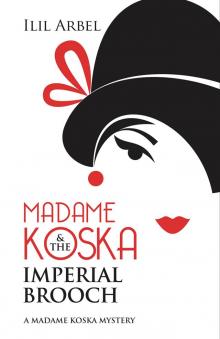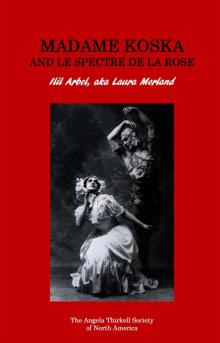- Home
- ILIL ARBEL
Madame Koska & the Imperial Brooch Page 2
Madame Koska & the Imperial Brooch Read online
Page 2
“She mostly does drawn work for other ateliers,” said Madame Golitsyn. “She does fifteen stitches to the inch, can you believe it? Not merely ten, like so many mediocre workers; with such skill, she is still in demand. But she is always taken advantage of, always underpaid. I think you will like her, Vera. She is timid and quiet, but a truly hard worker and very sweet.”
Madame Koska thought for only a moment, drumming her fingernails on the table. Anna’s advice was never, ever wrong. “Write to her, Annushka,” she said. “I can afford one more and I would love to have such a specialty. This kind of bead work will destroy the competition.”
“Thank you, my dear,” said Madame Golitsyn. “I will write tonight. Vasily will come too, of course, but I will find him something to do at my business; I am sure he could start by driving the deliveries. We’ll have to look after them a bit in the beginning, you know. Thankfully, they both speak reasonably good English.”
“All of you are such linguists… Yes, they can move into my current apartment, since I am moving above the Establishment,” said Madame Koska. “I’ll arrange it with my current landlord.”
“Thank you, Vera. How nice this would be for them! And it will be very convenient for you to live above the business,” said Madame Golitsyn. “Not quite as elegant as we want you to appear, but no one really has to know.”
“No, I am not telling anyone other than a few close friends,” said Madame Koska. “Nobody’s business. When the money starts coming in, I will get a place in the country for weekends and holidays.”
“I would love to visit you,” said Madame Golitsyn. “How nice, to go to the country. But that reminds me. I might have a rather interesting mannequin for you. I just thought of her…”
“That would be wonderful,” said Madame Koska. “Really good ones are hard to get. Who is she?”
“Her name is Mevrouw Gretchen Van der Hoven. She lives in the country now, with her aunt and uncle.”
“Mevrouw? So she is Dutch?”
“Half Dutch. Her father lived for years in the colonies, and married a Polynesian, I believe. Or Chinese… I am not sure. Gretchen is Eurasian, and you know how beautiful they can be. I cannot begin to tell you how lovely the girl is. She was educated in England, a boarding school, so her English is perfect.”
“Where are the parents?”
“Both dead, poor girl,” said Madame Golitsyn. “Sad. Mother died in childbirth, and her father met some strange accident a couple of years ago, I am not sure about the details. She was only seventeen years old at the time.”
“Does she have any training?” asked Madame Koska.
“Not professionally, but she did many charity shows,” said Madame Golitsyn. “With her looks, they would always pick her to do it.”
“Very well,” said Madame Koska. “As always, Vera, you have the best ideas, the solution to every problem.”
“Not all of them,” said Madame Golitsyn enigmatically. “Not the private ones, anyway… But most business issues, yes, these I can resolve. Well, let’s go and choose some beautiful, sumptuous curtain materials for the new Madame Koska Dressmaking Establishment!”
Be careful, young man!” exclaimed Madame Golitsyn as she was suddenly pushed from behind while trying to enter Madame Koska’s Establishment. All around her was chaos—movers carrying furniture, women in striped dressmakers’ smocks running back and forth with cardboard boxes, and men leaving with their tool boxes.
“Sorry ma’am,” mumbled the mover. “Couldn’t see you with these things…” He went past her, carrying two substantial dressmaker’s dummies, partially wrapped in brown paper.
“At least the plaque is on,” said Madame Golitsyn to a tall, very thin woman, past her first youth, who was walking by her side, carrying a large carpet bag. “That is very important. And it’s beautifully done. Well, come along, Natalya.” The woman, pale and timid, followed without a word. However, they were forced to stand aside since another mover pushed past them, carrying a chest of drawers.
“We’ll never get on these stairs,” said Madame Golitsyn. “It’s pandemonium… Natalya! Stand up straight. Don’t stoop like that. What your governess would have said about the way you stand, after all the hours she spent teaching you to balance a book on your head…”
“Dear Fräulein Strauss,” Natalya murmured. “Yes, she tried to make me stand up straight, and I did, but now… I am so tall, everyone will notice me.”
“You did not seem to like her so well when you were a child,” said Madame Golitsyn.
“What did I know…a child does not appreciate…but now that she passed away, I do miss her.”
“Then stand up straight for her sake, Natalya. I won’t have you meet my dear friend looking like a cowering serf.”
“But soon I am going to be only an employee of this atelier, a low-level employee, Aunt Anna. I know my place.”
“Nonsense. This is not Saint Petersburg. The classes here, are, well, a bit vague. It’s rather unique to this country, I know, but the English gentry mingle freely with the upper middle class.”
“And what am I? Not quite middle class, since I have no money. Not upper class for sure. My noble title was stripped away by the Revolution…”
“What are you? You are a Saltykov, Natalya. The cleanest, purest blood in old Russia. That is what you are! Be proud of it. And now, let’s get in. Seems the movers are taking a short break. One thing you must remember, though, malenkaya. We will not speak Russian—only English. Madame Koska insists that this is respectful for the other employees, and for her adoptive country.”
Natalya sighed with resignation, picked up the carpet bag, straightened her shoulders, and followed her aunt.
The commotion was even worse inside. The large, sunlit front room was full of furniture in complete disorder. Boxes overflowing with fabrics, beads, thread, needle cases, pin boxes, ribbons, and lace littered every surface. Seamstresses ran back and forth, carrying boxes to the sewing room and stacking them on the shelves. Madame Golitsyn went to a woman who was attempting to sort a huge box of ribbons into separate containers. “Excuse me, could you please find Madame Koska for me?” she asked. At this moment Madame Koska’s voice came from the sewing room, saying “No, no, ve don’t vant it here, ve vant the mirror in the other room…”
“Never mind,” said Madame Golitsyn. “Come along, Natalya.”
“Annushka! How nice to see you!” said Madame Koska, smiling hospitably, apparently entirely unperturbed by the mayhem.
“Is everything going well?” asked Madame Golitsyn.
“Perfectly,” said Madame Koska. “Just as it should. And who is your friend, Annushka?”
“This is my niece, Countess Natalya Saltykov,” said Madame Golitsyn. A slightly worried look came over Madame Koska’s face. Madame Golitsyn knew what bothered her friend. “I have explained to Natalya that here we must speak English, even among us, out of respect to our adoptive country and to those we work with who do not speak Russian. And I think Natalya would prefer to be called simply Miss Saltykov, wouldn’t you, dear? We don’t need to bring our titles into the conversation while we work. I certainly never do.” Relief showed very slightly on Madame Koska’s face. Anna always knew what to do…
“Yes, of course, my dear. Let’s go to the room that vill be my office and talk about your position,” she said. They went into a small room, which had only a desk and a few chairs in it. “Do sit down, ve must make do vith vhat ve have. So, Miss Saltykov, ven vould you like to start vorking? The sooner the better for me, I am sure.”
“Right away if you vish,” said Natalya. “I brought the samples of vork for to show how I do…” Her broken English would soon mend, thought Madame Koska enviously. These Russians had a natural knack for languages, such a useful talent…but the thought flew out of her mind when she saw the first garment. She gasped. Used as she was to good bead work, this was above and beyond anything she had ever seen. Tiny pearls, perfectly sewn to the scarlet velvet of the short
bolero-like vest, and couched with delicate gold embroidery, gave the effect of such opulence, such grandeur, as to bring tears to the eyes of a professional.
Madame Golitsyn smiled with satisfaction. She knew the effect her niece’s work always created. The other garment, pure lavender chiffon worked with amethysts and lapis lazuli beads, was so delicate it could probably soar if not firmly held. Madame Koska shook her head with disbelief. “My dear Miss Saltykov, you are an artiste! Of course you can’t start working until we open, but once we do, you shall be my head beader.” She named a very adequate salary, and to her surprise, Natalya started crying. “Vhat is the matter?” Madame Koska asked and Madame Golitsyn just hugged the girl and smiled at Madame Koska. “She is just happy,” she said to her friend.
“Yes, very happy,” said Natalya, sniffing. “I don’t like how zey vere tricking me in Paris, alvays arguing about money, not giving vhat zey promise…now I just do vork, don’t have to talk about money, I love my beading and ze pearls, love ze vork…” She touched her eyes with her handkerchief. Madame Koska noticed a border of extremely beautiful drawn thread work around it. Yes, she must love her work if she did that on a simple linen handkerchief, not even the proper voile… She looked at the girl with compassion mixed with some doubt.
“Let’s have some tea,” she said. “Vould you come over here for a second, Anna?”
“Certainly. One second. Natalya, stop crying. Everything will be fine and remember, Saltykov. Always remember it.” They moved away to a table where a thermos and some cups promised a picnic-like tea.
“She did not cry from happiness,” said Madame Koska, pouring tepid tea into the cups. “Or at least, not only from happiness. And what about Saltykov? Why must she remember it and how is it connected to the new job?”
Madame Golitsyn sighed. “No, it was not just happiness that made her cry. She really is very happy about the job, yes, and the good salary you offered, for which I also thank you. But she is struggling with the fact that while she is a scion of one of the most noble families in old Russia, she must work at all. This bead and pearl embroidery was her hobby in Russia, a pastime. She feels humiliated by having to work for a living. She must get used to it, and I know it sounds contradictory, but nevertheless she must remember being a Saltykov because it boosts her self-esteem. You see, we are quite an important family. It was a Saltykov who was chosen to be the father of Catherine the Great’s first child when her husband could not give her one…”
“Whatever do you mean?”
“Empress Elizabeth, who was the aunt of Peter, Catherine’s husband, realized that an heir to the throne was needed as soon as possible, but it might take years to cure her nephew of an illness that prevented him from producing children. Catherine was actually a virgin after a year of marriage. So, Elizabeth suggested a couple of young gentlemen, members of the most important families, as prospective fathers. Catherine chose one of them, a Saltykov, and he became her lover and gave her a child. All very discreet, very few people knew about it.”
“Her aunt-in-law arranged it? What a story!”
“Elizabeth was practical if nothing else. To keep the throne secure, an heir was absolutely needed. It was much more important than any question about morals.”
“You never mentioned it to me,” said Madame Koska.
“I live in the present, dorogaya. I don’t want to dream about past glories.”
“But Natalya can’t.”
“Not yet. Hopefully, she will, eventually. I think the pride she is going to take in being appreciated by you and her co-workers for her remarkable skill will help.”
“A highly successful opening reception,” said Madame Golitsyn to Natalya, who seemed to be a little out of place in her plain black dress.
“Yes indeed,” said Natalya, obviously ill at ease; she was hunched as if trying to minimize herself and hide behind Madame Golitsyn, which could not work since Madame Golitsyn was so much shorter than she. “But I really should not be here, Aunt Anna. I shouldn’t have come.”
“And why not, Natalya? Until you start working here, you are my niece, and you are perfectly entitled to come to a reception given by my very dear friend, not to mention catered by me. Look what a nice time your father is having.”
Natalya looked at her father with an indulgent smile. Yes, she thought. He was having a wonderful time, eating, drinking, talking to three elegant women at once… “Dear father,” she said. “I am so happy you brought us to England. He will be so much happier here.”
“And not drive a taxi anymore, either,” said Madame Golitsyn. “And why didn’t you wear something with your pearl embroidery? It would have caused an instant sensation; everyone here is a lover of fashion.”
“I did not think it would be appropriate to stand out,” said Natalya weakly. She realized too late that she would have stood out a lot less if she were better dressed.
“Well, never mind all that. Everything will be fine, stop worrying, malenkaya.” They spoke in Russian, as they always did, and suddenly Madame Golitsyn thought that Natalya’s English must be improved as quickly as possible; not that it would be difficult, since despite her timidity, Natalya was extremely talented. She took two glasses of champagne from a tray held by one of the women whom she remembered seeing when she first brought Natalya to the Dressmaking Establishment. The woman smiled and moved quietly and expertly among the guests, and Madame Golitsyn surveyed the glittering scene with satisfaction. The rooms, restored to perfect order, showed their elegant proportions, and were showcased by the creamy walls, the dark red window treatments, and the oriental carpets. Huge vases of flowers, all white, were beautifully arranged on low tables. The chandeliers gleamed and threw colorful rainbows. People seemed to enjoy her canapés as they drank their champagne. They clearly also appreciated the stuffed blintzes, the pride of her catering business, and adored by all her clients. The excellent fruit tarts and other pastries seemed to vanish very quickly.
“Look, here comes the beautiful Gretchen,” said Madame Golitsyn. “I must introduce her to Vera, she is going to work as a mannequin, I hope.”
Quickly approaching the girl, who had just entered the room, she took her to Madame Koska, who was by one of the serving tables. “Vera, my dear, I would like to introduce Mevrouw Gretchen Van der Hoven, of whom I have told you. Gretchen, this is my very dear friend, Madame Vera Koska.”
In a blink of an eye, faster than one word said aloud, Madame Koska took measure of the quality of the potential mannequin even before her own hand was raised high enough to shake the girl’s hand. She had rarely seen such beauty. Gretchen Van der Hoven was tall and willowy, with a perfect figure. She wore a well-fitting, clearly expensive suit, made of shantung silk of a soft caramel color. The skirt was ankle length, and the jacket, shorter than the blouse, created a three-layered look. She was evidently a Eurasian. Her eyes, very dark, long and narrow under the slightly diagonal brows, the soft, rounded features, the ivory-colored skin with just a touch of golden tint to warm it, and the full mouth emphasized by the red lipstick, indicated her origin. Her hair, straight and thick like most Eurasian hair, was not black. Peeking from under the large brown hat made of crushed velvet and embellished with golden silk poppies, it was the color of dark amber. Most unusual, thought Madame Koska, and yet unquestionably natural and without any help from the art of the coiffeur; she would do very well as a mannequin.
“I am very happy to meet you, Mevrouw Van der Hoven,” she said in her best velvety, Russian voice.
“And I am delighted to meet you, Madame Koska,” said the girl in a high-pitched but pleasant voice without a trace of accent. “Madame Golitsyn told me so much about your establishment! I was so excited when she said that you might consider me for the position of a mannequin! I would be so honored! Oh, please consider me!”
“Consider you? My dear, vith the vay you look, it is as good as arranged,” said Madame Koska. “Ven can you start?”
“Why, right away, Madame Koska. A
nytime you like! Now!”
“Even vithout talking about terms?” asked Madame Koska, amused by the girl’s innocent enthusiasm.
“Oh, I don’t care about all that,” said Gretchen with childish disregard for the prosaic side of life. “I just want to be a mannequin…to wear these heavenly clothes, to meet all these interesting people! And I know you will take good care of me, you are a friend of Madame Golitsyn, after all.”
“In vhich case, let me introduce you to a few people…excuse us, Anna.”
Madame Golitsyn smiled happily as she returned to her niece. “So all is well?” asked Natalya.
“Oh, yes, they liked each other right away. I am happy to find Gretchen a good place, she needs to start growing up and learning some independence,” said Madame Golitsyn. “She is so child-like.”
“But she is so incredibly beautiful,” said Natalya without the slightest touch of envy. “She would have done well at the Tsar’s court.”
“Try to forget those days, Natalya. You must live in the present. Here comes Gretchen and Madame Koska. I think Madame Koska wants to introduce the two of you.”
Introductions were soon made, and chatting in French, the two girls seemed to have quite a lot to talk about, mostly about their future work together. Madame Koska drew her friend aside and looked carefully around to make sure no one was listening.
“Anna,” she said very quietly. “I won’t be able to keep up the façade here in London. I simply have to learn Russian. In Paris, everyone talked French. Here, it’s another matter altogether. I will be caught.”
“Well, you learned French when you came there,” said Madame Golitsyn. “You can learn Russian. It’s not too difficult, and you already mastered the accent.”
“I’ll need a teacher. You don’t have the time to teach me, you are too busy with the catering,” said Madame Koska.

 ANCIENT ALIENS: MARRADIANS AND ANUNNAKI: VOLUME ONE: EXTRATERRESTRIAL HOLIDAYS
ANCIENT ALIENS: MARRADIANS AND ANUNNAKI: VOLUME ONE: EXTRATERRESTRIAL HOLIDAYS Ancient Aliens_Marradians and Anunnaki_Volume Two_Extraterrestrial Gods, Religions, and Mystical Practices
Ancient Aliens_Marradians and Anunnaki_Volume Two_Extraterrestrial Gods, Religions, and Mystical Practices Madame Koska & the Imperial Brooch
Madame Koska & the Imperial Brooch Ancient Aliens: Marradians and Anunnaki: Volume Two: Extraterrestrial Gods, Religions, and Mystical Practices
Ancient Aliens: Marradians and Anunnaki: Volume Two: Extraterrestrial Gods, Religions, and Mystical Practices Miss Glamora Tudor!: The New Chronicles of Barset: Book One
Miss Glamora Tudor!: The New Chronicles of Barset: Book One The Cinnabar Box (Guardians of the Earth)
The Cinnabar Box (Guardians of the Earth) Madame Koska and Le Spectre de la Rose
Madame Koska and Le Spectre de la Rose The Lemon Tree
The Lemon Tree Their Exits and their Entrances: The New Chronicles of Barset: Book Two
Their Exits and their Entrances: The New Chronicles of Barset: Book Two